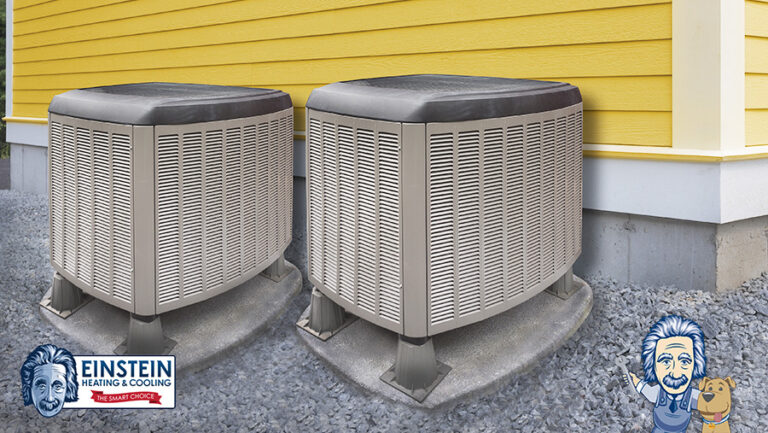
When your HVAC system is in need of repair, trust Einstein Heating and Cooling for reliable and efficient service.
Our experienced technicians specialize in diagnosing and resolving a wide range of HVAC system issues.
Whether your system is not providing adequate heating or cooling, experiencing airflow problems, or making strange noises, we have the expertise to fix it promptly. We understand the importance of a properly functioning HVAC system for your comfort and energy efficiency. With our commitment to exceptional service, you can trust us to restore your HVAC system to optimal performance.
HVAC (heating, ventilation, and air conditioning) systems are critical components of any building or home. They are responsible for regulating the temperature, humidity, and air quality, creating a comfortable and healthy living environment. However, HVAC systems can break down or experience issues, leading to reduced performance, increased energy consumption, and potential safety hazards. In this article, we will discuss HVAC system repair, including common issues and their solutions, as well as tips for maintaining your HVAC system to avoid breakdowns.
HVAC systems are made up of various components, including compressors, motors, fans, and coils, which can fail due to wear and tear or other issues. If a component is faulty, it can cause the entire system to malfunction, leading to reduced performance, increased energy consumption, and potentially hazardous situations. Some common faulty components include:
Refrigerant leaks are a common issue with HVAC systems, particularly older ones. If the refrigerant level is low, it can cause reduced performance and increased energy consumption. In addition, refrigerants can be harmful to the environment, so it is important to fix any leaks as soon as possible. Some common causes of refrigerant leaks include:
Electrical problems are another common issue with HVAC systems. If the wiring is damaged or the controls are malfunctioning, it can cause the system to stop working or operate inefficiently. Some common electrical problems include:
Airflow issues are another common issue with HVAC systems. If the airflow is restricted or uneven, it can cause reduced performance and increased energy consumption. Some common airflow issues include:
The thermostat is the control center of the HVAC system, responsible for regulating the temperature and controlling the system’s operation. If the thermostat is malfunctioning, it can cause the system to stop working or operate inefficiently. Some common thermostat issues include:
While HVAC system issues can be frustrating and expensive to repair, many of them can be avoided with proper maintenance. Here are some tips for maintaining your HVAC system:
Change or clean the air filters regularly. This will help to ensure proper airflow and prevent dust and debris from accumulating in the system.
Keep the outdoor unit clear of debris, such as leaves, grass, and other vegetation. This will help to ensure proper airflow and prevent damage to the unit.
Have your HVAC system serviced annually by a qualified technician. This will help to ensure that the system is operating efficiently and prevent potential issues from developing.
Install a programmable thermostat to help regulate the temperature and reduce energy consumption.
Consider upgrading to a more energy-efficient HVAC system. This can help to reduce energy consumption and save money on utility bills over time.
Diagnosing and repairing HVAC system issues can be a complex process that requires a combination of technical knowledge and practical experience. Some common problems that may arise in HVAC systems include faulty components, refrigerant leaks, electrical problems, airflow issues, and thermostat malfunctions.
To diagnose an HVAC system issue, the first step is to conduct a thorough inspection of the system. This may involve checking the refrigerant levels, inspecting the electrical wiring and components, measuring the airflow, and testing the thermostat. If a problem is identified, the next step is to determine the root cause of the issue.
If the problem is related to faulty components, such as a malfunctioning compressor or fan motor, the component will need to be replaced. This may involve removing the old component, sourcing a new one, and installing it according to manufacturer specifications.
If the issue is a refrigerant leak, the first step is to locate the source of the leak. This may involve using specialized equipment to identify the leak and then repairing the damaged area or replacing the faulty component.
Electrical problems in HVAC systems can be more difficult to diagnose, as they may be caused by a wide range of factors. Some common issues include loose connections, damaged wiring, or faulty controls. To diagnose and repair electrical problems, it is important to have a thorough understanding of electrical systems and be able to use specialized tools to test the various components.
Airflow issues can be caused by a variety of factors, including dirty filters, blocked ducts, or faulty fans. To diagnose and repair airflow issues, it is important to check the filters, clean the ducts, and inspect the fans to ensure they are functioning properly.
Thermostat malfunctions can also cause issues with HVAC systems. If the thermostat is not working correctly, it may be necessary to replace it or reprogram it to ensure that it is properly calibrated.
In all cases, it is important to follow manufacturer guidelines and best practices when diagnosing and repairing HVAC system issues to ensure that the system operates safely and efficiently. If you are not comfortable with the process, it is recommended that you seek the help of a qualified HVAC technician.
HVAC system repair can be complex and costly, but many issues can be avoided with proper maintenance and care. By understanding common HVAC system issues and their solutions, as well as tips for maintaining your system, you can help to ensure that your HVAC system operates efficiently and safely for years to come.
If you do experience HVAC system issues, it is important to contact a qualified technician to diagnose and repair the issue promptly, as delaying repairs can lead to further damage and potentially hazardous situations.
Are you ready to transform your entrepreneurial aspirations into a tangible venture and embrace the exciting realm of franchise ownership? With a few decisive moves, you could be on the fast track to extraordinary success. Don’t hesitate any longer; embark on your path to becoming the proud boss of your very own business today!
